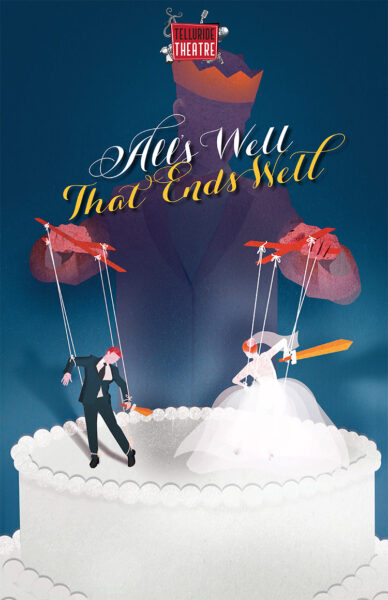
27 Jul Telluride Theatre: All’s Well That Ends, Well? A Review!
Telluride Theatre’s 32nd annual Shakespeare in the Park 2022 is “All’s Well That Ends Well.” The production will be performed on the Town Park Stage, July 22- July 31. Tickets, $30 (adults); $20 (under 18), are on sale now at www.telluridetheatre.org.
The show goes up rain or shine, as the audience is covered by the Town Park stage, but please dress for the cold mountain evenings. No outside liquor is allowed, however, concessions are available to purchase. The show is dark on Thursday, July 28.
Go here for more about Telluride Theatre.
And please scroll down for our review.

Once upon a time and far far away Martians and Venusians fell in love and enjoyed happily-ever-after relationships. Then they came down to Earth – and amnesia set in: they totally forgot they were from different planets with different values and perspectives.
To mitigate the ensuing cacophony and associated heartbreak, in 1992, psychologist Dr. John Gray wrote what became the modern classic, “Men Are From Mars, Women Are from Venus,” a guide to understanding the opposite sex.
But that was way after Shakespeare penned “All’s Well That Ends Well,” (around 1602 -1604), one of three so-called problem plays, which Telluride Theatre’s guest director, Becca Wolff, set up as a tale of miracle cures, derring-do, fairytale optimism, real-world pessimism – and a guide of sorts about understanding the opposite sex.
The Twitter version of the plot is this: Helen heals the King of France, and the King then grants her permission to marry Bertram, the man she is obsessed with. But Bertram rejects the lady, leaving a list of tasks she must complete to have him acknowledge their marriage. Helen follows her man to Italy, completes all the tasks, and Bertram accepts her as his wife. “All’s Well That Ends Well”?
Wolff staged the production as fantasy world in which time is erased: cell phones and bikes, young soldiers costumed in modern desert-style combat fatigues – a gaggle of totally beguiling kiddos – seamlessly shared the boards with sequined lords and ladies, everyone occasionally and very engagingly breaking out in song and dance. (Thanks also to Cat Covert.) The focus of the story is love, lust, deception, female lack and masculine power, themes that reflect the summer of Anthony Weiner, Arnold Schwarzenegger and Harvey Weinstein and reinforce the sorry fact that a story of social mobility and sexual misconduct resonates still today.
And yes, that is a thorny cocktail, but then: “I like problems – the thornier the better. I believe humans are at their best tackling questions that have no easy answers,” Wolff recently stated.
What’s more, if ever there was an 17th-century tale that made a case for women as leaders in search of a bigger canvas, this is it. And Helen, one of the strongest women in the Bard’s repertoire, is the reason, a fact made abundantly clear in Telluride Theatre’s production, which runs through July 31.
As Helena, the lovely Ursula Ostrander, offered up an intoxicating cocktail of sexual desire, steely determination, spunkiness, cunning, servility and virtue, deftly switching gears from unworthy doormat to dominating doer. Whenever she was on stage, which, thankfully, was often, she stole the limelight. It may have been distasteful to see our heroine fall so heavily for Bertram, but we were made to admire the resourcefulness with which she ensnared her love, proving female desires can and often do win out in patriarchal cultures.
Carl McMahon was Bertram, Count of Rousillion, one of the Bard’s less attractive confections. And he played it like the cad he is: boring, sulky, arrogant – right up to the very end when our anti-hero seemed in a dance trance to acknowledge a deep and growing attraction to the wife he once rejected out of hand. A sign of maturity? Perhaps.
The supporting cast featured other notable performances.
She was brave and funny as the mustached ratio announcer in “Hands on Hardbody”; big and bold as the addled drunk Stefano in “The Tempest.” In All’s Well,” she is the Countess of Roussillion. Suzanne Cheavens is clearly a fearless shape-shifter, who portrayed this refined character with authority and a clear understanding of the vagaries of love. Julia Caulfield was an effectively feisty, witty and wise Diana. In “Hands on Hardbody” Sue Knechtel played a tooth-compromised, feisty, no-fuss/no-frills tough old bird named Janis. And she had the audiences in stitches. In “All’s Well” Knechtel is camouflaged once again and once again pitch perfect, this time as Lord Lafew, the dignified and sharp-witted straight man to some of the broader comedy. The height of quirkiness and bravado fell to Tom Shane, who happily returns to the Telluride Theatre’s stage, equally crowd-pleasing as the King of France and Fool. (Was that Wolff making a sly comment on nobility?) James van Hooser brings Bertram’s sidekick, the pretentious, lying Parolles to endlessly amusing life as a tricked-out braggart, unsure of his footing in the world. (And one who eventually, violently loses it altogether.)
The rest of the cast – Cassidy Craige, Matt Hoisch, Sam Young, Sylvia Trn Dalton, and all the kiddos – fully embodied their characters and seemed to be having a ball at every turn which, in the end of “All’s Well,” is the name of the game.
Footnote: As the Countess observed in that first scene: “Love all, trust a few, Do wrong to none.” How about that for a socio-political banner in our increasingly divided nation? If we learned to live that truth, perhaps “All’s Well” would end well – or at least better.


Sorry, the comment form is closed at this time.